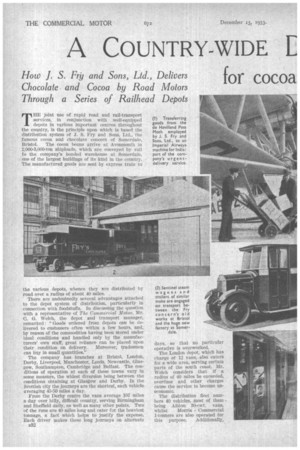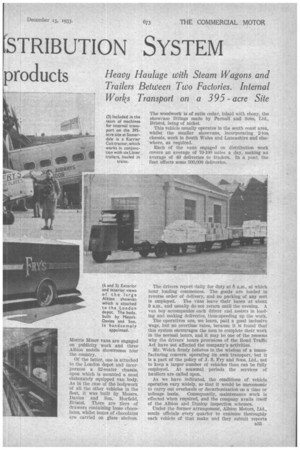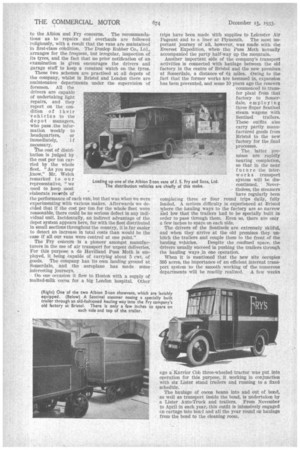A COUNTRY-WIDE E STRIBUTION SYSTEM for cocoa
Page 50

Page 51

Page 52

If you've noticed an error in this article please click here to report it so we can fix it.
products
How J. S. Fry and Sons, Lid., Delivers Chocolate and Cocoa by Road Motors Through a Series of Railhead Depots Heavy Haulage with Steam Wagons and Trailers Between Two Factories. Internal Works Transport on a 395 acre Site
TIIE joint use of rapid road and rail-transport services, in conjunction with well-equipped depots in various important centres throughout the country, is the principle upon which is based the distribution system of J. S. Fry and Sons, Ltd.. the .famous cocoa and chocolate concern of Somerdale, Bristol. The cocoa beans arrive at Avonmouth in 2,000-3,000-ton shiploads, which are conveyed by rail fo the company's bonded warehouse at Somerdale, one of the largest buildings of its kind in the country. The manufactured goods are sent by express train to
the various depots, whence they are distributed by road over a radius of about 40 miles.
There are undoubtedly several advantages attached to the depot system of distribution, particularly in connection with foodstuffs. In discussing the question with 0. representative of The Commercial Motor. Mr. C. G. Welch, the depot and transport manager, remarked : "Goods ordered from depots can be delivered to customers often within a few hours, and, by reason of the commodities having been stored under ideal conditions and handled only by the manufacturers' own staff, great reliance can be placed upon their condition on delivery. Moreover, tradesmen can buy in small quantities."
The company has branches at Bristol, London, Derby, Liverpool, Manchester, Leeds, Newcastle, Glasgow, Southampton, Cambridge and Belfast. The conditions of operation at each of these towns vary in some measure, the widest diversion being between the conditions obtaining at Glasgow and Derby. In the Scottish city the journeys are the shortest, each vehicle averaging 45-50 miles a day.
From the Derby centre the vans average 107 miles a day over hilly, difficult country, serving Birmingham and Sheffield daily, as well as many other points. Two of the runs are 40 miles long and cater for the heaviest tonnage, a fact Which helps to justify the expense. Each driver makes these long journeys on alternate B32 days, so that no particular operative is overworked. The London depot, .which has charge of 12 vans, also caters for a wide area, serving certain parts of the south coast. Mr. Welch considers that if a radius of 40 miles be exceeded, overtime and other charges cause the service to become uneconomic.
The distribution fleet numbers 40 vehicles, most of them being Albion 30-cwt. vans, whilst Morris Commercial 1-lonners are also operated for this purpose. Additionally, Morris Minor vans are engaged on publicity work and three Albion mobile showrooms tour the country.
Of the latter, one is attached to the London depot and incorporates a 32-seater chassis, upon which is mounted a most elaborately equipped van body. As in the case of the bodywork of all the other vehicles in the fleet, it was built by Messrs. Davies and Son, Horfield, Bristol. There are tiers of drawers containing loose chocolates, whilst boxes of chocolates are carried on glass shelves. The woodwork is of satin cedar, inlaid with ebony, the showcase fittings made by Parnall and Sons, Ltd., Bristol, being of nickel.
This vehicle usually operates in the south coast area, whilst the smaller showvans, incorporating 2-ton chassis, work in South Wales and Lancashire and elsewhere, as required.
Each of the vans engaged on distribution work covers an average of 70-100 miles a day, making an average of 40 deliveries to traders. In a year, the fleet effects some 500,000 deliveries.
The drivers report daily for duty at 8 a.m., at which hour loading commences. The goods are loaded in reverse order of delivery, and no packing of any sort is employed. The vans leave their bases at about 9 a.m., and usually do not return until the evening. A van boy accompanies each driver and assists in loading and making deliveries, thusispeeding up the work. . The operatives are, we learn, paid a good inclusive wage, but no overtime rates, because it is found that this system encourages the men to complete their work in the normal hours, and it may be one of the reasons why the drivers' hours provisions of the Road Traffic Act have not affected the company's activities.
Mr. Welch firmly believes in the wisdom of a manufacturing concern operating its .own transport, but it is a part of the policy of J. S. Fry and Sons, Ltd., not to keep a larger number of vehicles than can be fully employed.. At seasonal periods the services of hauliers are called upon.
As we have indieated, the conditions of vehicle operation vary widely, so that it would be uneconomic to carry out overhauls or decarbonization on a time or mileage basis. Consequently, maintenance work is effected when required, and the company avails itself of the Albion and Dunlop inspection schemes.
Under the former arrangement, Albion Motors, Ltd., sends officials every quarter to examine thoroughly each vehicle of that make and they submit reports n33 to the Albion and Fry concerns. The recommendations as to repairs and overhauls are followed religiously, with a result that the vans are maintained in first-class condition. The Dunlop Rubber Co., Ltd., arranges for the frequent, but irregular, inspection of its tyres, and the fact that no prior notification of an examination is given encourages the drivers and garage staff to keep a constant watch on the tyres.
These two schemes are practised at all depots of the company, whilst in Bristol and London there are maintenance departments under the supervision of foremen. All the • drivers are capable of undertaking light repairs, and they report on the condition of their vehicles to 'the depot managers, who pass the information weekly to 'headquarters, or immediately, i f necessary.
The cost of distribution is judged by the cost per ton carried by the whole fleet. "As you may .know," Mr. Welch remarked to our representative, "we used to keep most elaborate records of the performance of each van, but that was when we were experimenting with various makes. Afterwards we decided that if the cost per ton for the whole fleet were reasonable, there could be no serious defect in any individual unit. Incidentally, an indirect advantage of the depot system appears here, for with the fleet distributed in small sections throughout the country, it is far easier to detect an increase in total costa than would be the .case if all our vans were centred at one point." The Fry concern is a pioneer amongst manufacturers in the use of air transport for' urgent deliveries. For this purpose a de Havflland Puss Moth is employed, it being capable of carrying about 5 cwt. of goods. The company has its own landing ground at Somerdale, and the aeroplane has made some interesting journeys.
On one occasion it flew to Heston with a supply of malted-milk cocoa for a big London hospital. Other trips have been made with supplies to Leicester Air Pageant and to a liner at Plymouth. The most important journey of all, however, was made with the Everest Expedition, when the Puss Moth ltetually accompanied the party half-way up the mountain.
Another important side of the company's transport activities is connected with haulage between the old factory in the centre of Bristol and the new premises
at Somerdale, a distance of 6i miles. Owing to the
,fact that the former works tire hemmed in, expansion has been prevented, and some 10 years ago the concern commenced to transfer plant from that factory to Somerdale, employing three Super Sentinel steam wagons with Sentinel trailers. These outfits also carry partly manufactured goods from Bristol to the new factory for the final processes.
The latter premises are rapidly nearing completion, so that in the near future the interworks transport system will be discontinued. ' Nevertheless, the steamers have regularly been completing three or four round trips daily, fully loaded. A serious difficulty is experienced at Bristol where the hauling ways to the factory are so narrow ind low that the trailers had to be specially built in order to pass through them. Even so, there are only a few inches to spare on each side.
The drivers of the Sentinels are extremely skilful, and when they arrive at the old premises they unhitch the trailers and couple them to the front of the
hauling vehicles. Despite the confined space, the drivers usually succeed in pushing the trailers through the hauling ways in one operation.
When it is mentioned that the new site occupies 395 acres, the importance of an efficient internal transport system to the smooth working of the numerous departments will be readily realized. A few weeks
ago a Karrier Cob three-wheeled tractor was put into operation for this purpose, it working in conjunction with six Lister stand trailers and running to a fixed schedule.
The haulage of cocoa beans into and out of bond, as well as transport inside the bond, is undertaken by a Lister Auto-Truck and trailers. From November to April in each year, this outfit is intensively engaged on cartage into bond and all the year round on haulage from the bond to the cleaning room.




































































































